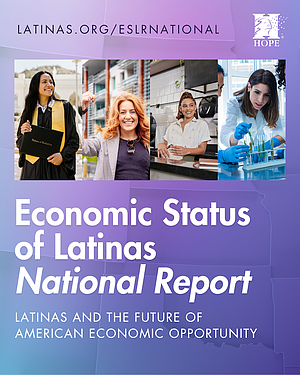10/15/2025

HOPE (Hispanas Organized for Political Equality) has released its first National Economic Status of Latinas Report, offering a comprehensive look at the economic, educational, and leadership experiences of Latinas across the United States. The report combines national data with focus groups conducted in California, Texas, Florida, New York, and Illinois—the five states with the largest Latina populations.
In Texas, Latinas number 6.24 million, nearly 20% of the state’s population. The report finds strong workforce participation, with 54.7% of Latinas in the labor force and an unemployment rate of 4.8%. Education levels show that 21.1% of Texas Latinas hold a college degree or higher. Entrepreneurship is also a key strength: 17.7% of women-owned small businesses in Texas are Latina-owned, one of the highest rates nationwide.
Despite these advances, the report highlights persistent economic challenges. The average income for Texas Latinas is $62,906—earning just 42 cents for every dollar earned by White, non-Hispanic men. This wage gap translates to an estimated $1.7 million in lost lifetime earnings per individual. Focus group participants, primarily first-generation Latinas, described navigating education, careers, and financial systems without inherited guidance, often relying on multiple income streams and entrepreneurial ventures while facing concerns around debt, housing, and investment.
Nationally, Latinas contributed $1.3 trillion to the U.S. economy in 2021, with labor force participation reaching a record-high 58.9% in 2024. While increasingly college-educated and the youngest major demographic group, Latinas still encounter barriers such as unequal pay, occupational segregation, and limited access to capital.
Helen Iris Torres, CEO of HOPE, emphasized that removing these obstacles is key to unlocking economic growth: “Latinas are stepping up in every sector of the economy, yet many still confront significant barriers such as unequal pay, limited access to capital, and underrepresentation in leadership roles.”
The full report is available at www.latinas.org/eslrnational.
